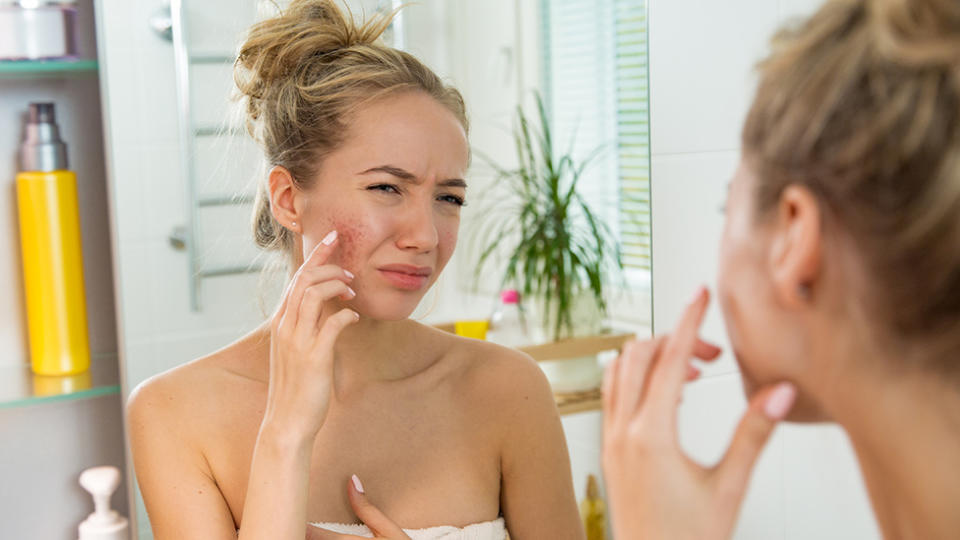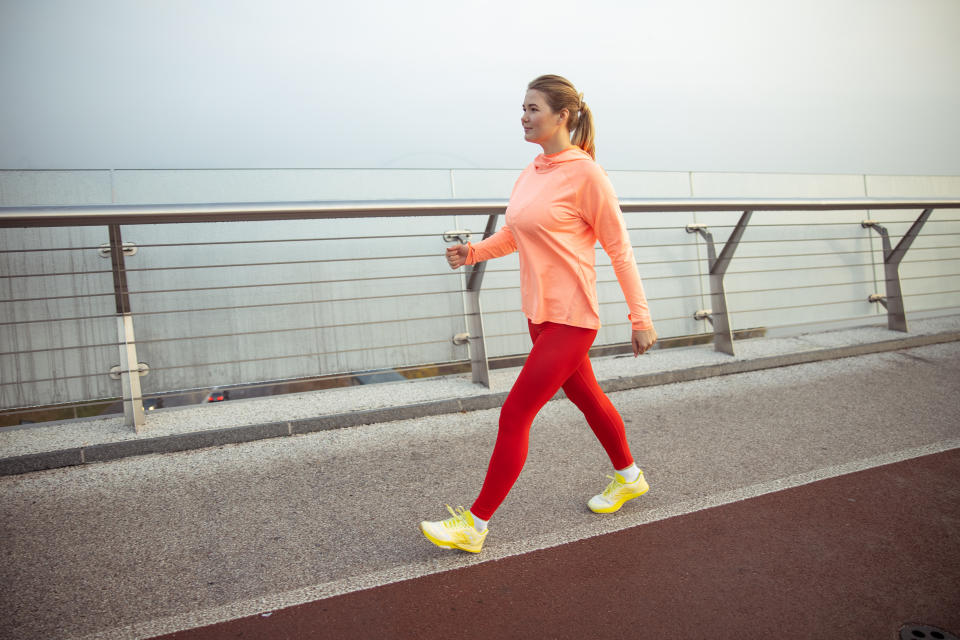Do you have 'iso skin'? Why lockdown could be to blame for your breakouts
If you thought you would emerge from coronavirus isolation with glowing skin but you’ve found that your face has broken out worse than ever, there might be a few reasons for that.
With working from home becoming the new norm and rocking up to a Zoom meeting barefaced almost becoming expected, many people thought this change in lifestyle would have nothing but positive impacts on their skin, yet all they’ve experienced is dry itchy patches and sore pimples.

Yahoo Lifestyle spoke with the experts to find out what’s really behind your ‘iso skin’ and what steps you should take to combat the issues.
You’re wearing less makeup, but getting more breakouts
Spending time at home has become the new ‘going out’ in 2020 as COVID-19 spreads around the world and we try to flatten the curve.
Less social events for many means they haven’t even touched their makeup case, however, while it should mean their skin has ‘time to breathe’ it seems their face has freaked out.
According to Antoinette Barnardo, co-founder and innovation director of Australian skincare brand YORA Skin Science, said people need to consider a few factors when it comes to changes in the skin.
One of the biggest things you need to ask yourself is if you’re still cleansing your skin daily and following up with a moisturiser, or if you’ve let your hygiene standards slip.
“It’s easy to become a little more relaxed when you are not getting up and performing your usual skincare routine, which will result in some changes in the skin,” she said.
Other factors to consider are if you’re exfoliating as you usually would or making time to do a mask? These things can open up your pores and remove the dirt and impurities such as pollution.
However if you’re over-exfoliating, you may diminish or compromise the skin’s protective barrier, which can lead to inflammation.
Antoniette said that while people may be shunning their usual full makeup routine, others are still using a bit of concealer or powder and then may be forgetting to remove it at night.
“This may result in clogging pores, especially if not removed and cleansed at the end of the day,” she said.
What else is contributing to your ‘iso skin’?
Dr Vivek Eranki, a leading Australian cosmetic surgeon and head of Australian Cosmetic, says that while it’s beneficial to give your skin a break from makeup, there are many other things that need to be considered when you’re inspecting the cause of your breakouts.
“Isolation due to the pandemic comes with its own challenges which include stress, diet, alcohol consumption, smoking and in some cases poor hygiene,” he said.
“These factors also contribute to non-inflammatory skin conditions or dermatosis.”
Dr. Eranki said that people may be subjected to prolonged exposure to dry air from air conditioners or heaters, which leads to flare-ups of acne and eczema.
He also said spending more time indoors can also lead to a Vitamin D deficiency, which accelerates aging and has been associated with dry skin, psoriasis and atopic dermatitis.
Antoinette Barnardo reckons people need to consider things like if their exercise has now shifted from indoors in a gym to outdoors.
“This can expose the skin to pollution, dust particles and also cooler temperatures as the days grow colder,” she said.

“This may cause a spike in more congested skin that breaks out or looks a little lack-lustre, especially if not cleansed properly.
Lack of exercise can also result in “sluggish lymphatic drainage, because our lymph system needs movement to detox our bodies and skins from harmful particles.”
Stress can have a major impact on the skin, particularly of a hormone called corticotropin-releasing-hormone (CRH), which leads to increased oil production in the skin.
“Stress from loss of income or worrying about losing your job can lead to anxiety, coupled with depression and result in behavioural changes, like not wanting to get up and perform our usual daily routines, including our skincare routines or not wanting to exercise,” she said.
One of the last things that could be causing your skin to go all out of whack is any changes to your diet during coronavirus isolation.
“Poor diet from lack of nutrient rich foods such as fruits, berries, vegetables and oily fish can result in dull looking skin and deficiencies,” Antoniette said.
Nutrient-rich meals containing veggies such as carrots and tomatoes which contain carotenoids for the skin’s connective tissue, berries that are high in antioxidants to fight free radicals from stress or outdoor pollutant and healthy oily fish to support the skin’s natural barrier will all help to combat any issues you’re experiencing, according to Antoniette.
How should I treat my skin at home?
One of the number one things you should try to avoid for both the spread of coronavirus and breakouts is to stop touching your face.
If your hands aren’t clean and you touch your face, you’re likely to transfer the dirt onto your skin which in turn will lead to breakouts and blemishes.
Dr Vivek Eranki recommends reviewing your makeup regime, using it as sparingly as possible and choosing sheer, water-based, non-comedogenic products that won't clog your pores.
Your skincare routine is also extremely important, with Dr. Eranki believing the best ‘bang for your buck’ comes from investing in a good moisturiser and soap.
“Make sure the moisturiser is emollient based and fragrance-free. Moisturising is not only for the day time but also for the night time,” he said.
“We recommend patients match the moisturiser to their skin time. Some patients have naturally oily skin while others have naturally dry skin.
“For patients with naturally oily skin, a serum works well to hydrate and protect and for those with more dry complexions, they would benefit from a lotion or cream. We also recommend patients invest in a good soap that doesn’t completely strip away your natural oils on your skin.”

Once you have your moisturiser, the next step is to get your hands on an exfoliator with organic plant-based ingredients such as fruit enzymes, rhassoul clay, finely ground oats and non-abrasive walnut shell, which work in harmony with the natural physiology of your skin, encouraging the skin’s natural renewal process.
“Exfoliating not only removes dead skin layers but also removes built-up grime. This helps your skincare to penetrate deeper providing better nourishment to your skin cells. Frequency of exfoliating is also very important,” Dr. Eranki said.
“If your skin is currently inflamed or sensitive, do not exfoliate until it has healed. Once its healed, gently exfoliate once a week. For normal or dry skin, we recommend exfoliating one to two times per week. For oily skin, we suggest you exfoliate two to three times per week.”
Dr Eranki also recommends people invest in a Vitamin serum and A and foods rich in it such as salmon, beef liver, dairy products, eggs, fish, cod liver oil and shrimp.
Vitamin A is considered effective for treating and controlling acne and it’s also easily absorbed by the skin when it’s applied topically.
Products rich in Vitamin C are also beneficial in helping to keep skin plump and firm by accelerating the production in collagen and elastin.
“Vitamin C also inhibits your skin's melanin production. Melanin production causes skin discolouration, dark spots and hyperpigmentation. When used regularly, Vitamin C can help prevent dark spots from forming in the first place,” Dr. Eranki said.
Got a story tip or just want to get in touch? Email us at lifestyle.tips@verizonmedia.com.

 Yahoo Lifestyle
Yahoo Lifestyle 




